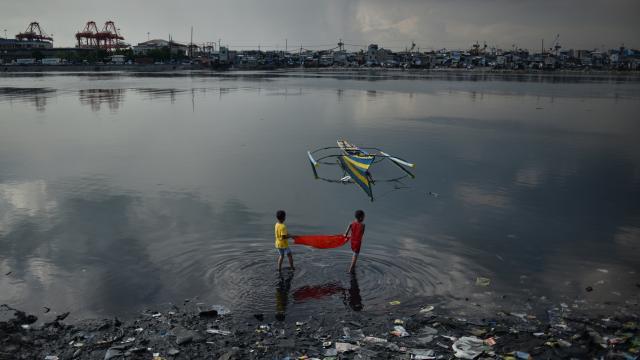For French President Emmanuel Macron to address delegates at this Thursday’s Climate Vulnerable Forum, he would have to hop an 13,700km plane ride from Paris to Majuro in the Marshall Islands. Roundtrip, that would put 7.2 tons of carbon dioxide into the atmosphere.
Add in the prime ministers of Grenada, Niger, and Lebanon along with 19 other world leaders expected to attend the summit, and you’re talking 491,000km of travel and 117 tons of carbon pollution to get there and back. But ahead of the summit, no planes took the sky.
The leaders of the 48 most climate-vulnerable nations in the world stayed at home, as did their counterparts in some of the world’s most wealthy countries. The Climate Vulnerable Forum, which aims to ratchet up global climate ambition ahead of a major conference in Poland, is the world’s first virtual climate summit. And it could set an example of how to walk the climate walk and engage civil society more meaningfully using technology.
The summit is the first time leaders from the Climate Vulnerable Forum, a group of nations facing the worst impacts of climate change with limited resources to adapt, have come together. The planning began in 2016 under the chairmanship of Ethiopia and continued by the Marshall Islands’ president in 2018. They knew they wanted to make a statement, and making the summit virtual was the clearest way to do that.
“They thought this is the perfect opportunity not to squander very scarce resources that Pacific Islands have,” Hala Kilani, an organiser with the Climate Action Network which is partnering with the summit, told Earther. “To organise the summit virtually is to make this a blueprint for future climate forums.”
The summit takes place a few weeks ahead of international climate talks in Poland. The purpose of the summit, and those talks, is to figure out how world leaders can take even more bold action than what they committed to under the Paris Agreement. Ahead of the summit, the Marshall Islands has already committed to a more ambitious plan to reduce carbon pollution that’s in line with recommendations put out by scientists last month.
The summit will be a chance to for other leaders to discuss how to rally the rest of the world. Climate Vulnerable Forum members and other world leaders like France’s Macron will post pre-recorded statements on Thursday. There will also be live panels hosted on Facebook Live on the summit’s page. Greenpeace and Oxfam will also carry the feed on their pages where anyone can watch and interact. The summit also has a hashtag (#virtualclimatesummit) where Twitter users can follow along and chip in.
“It’s a conversation anyone can have at anytime,” Kilani said. “It’s a 24-hour event that will serve all time zones.”
The concept sounds simple, but it sends a powerful message. Scientists made it clear in a only getting more crowded and polluted.
These are all realities climate negotiators are intimately aware of, which inevitably leads to criticism of the annual climate conferences held around the world.
“The public doesn’t yet feel the urgency that the scientific evidence warrants,” Peter Kalmus, a climate scientist who has written a book about his own low carbon lifestyle, told Earther. “Given their busy lives and the complexity of the issue, they naturally look to experts to gauge how urgent the problem is. When those experts burn lots of fossil fuel, their actions send a message of non-urgency that might speak more loudly than their words.”
Staging a virtual summit is a way to show that a climate-sound future is possible and that at least some world leaders are committed to that vision. For those leaders, it’s also a matter of making sure their nations survive.
“These countries are under immediate threat from climate change,” Kilani said. “They are trying their best to save themselves from the impending doom and trying to do so by setting an example themselves.”
On a democratic level, a virtual summit also flattens the playing field, removing barriers like plane tickets and conference passes that inevitably leave those most impacted by climate change on the outside looking in.
Kilani noted that recent wildfires and hurricanes show even the U.S. is vulnerable to climate shocks, underscoring how this summit is really for everyone.
“Vulnerability is everywhere,” she said.
